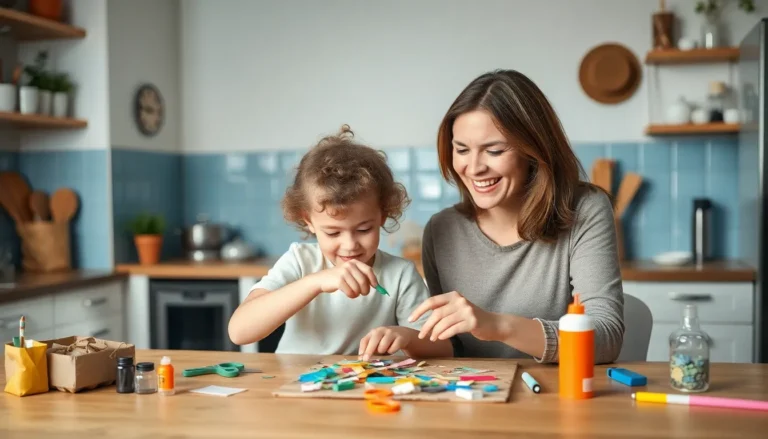Let’s face it: parenting can sometimes feel like you’re trying to juggle flaming torches while riding a unicycle. And if you’re a mom, you know exactly what I mean. Between chaotic schedules, endless laundry, and those mini tornadoes of energy we call children, it’s easy to feel overwhelmed. But hold up, it doesn’t have to be this way. Here’s a treasure trove of effective parenting tips that can turn those everyday challenges into manageable hurdles. Whether you’re navigating toddler tantrums or tween attitudes, these hacks are designed to simplify your life and make parenting a little less messy (and a lot more fun). So, buckle up and prepare to revolutionize your parenting game.
Table of Contents
ToggleUnderstanding Parenting Challenges

Parenting in today’s fast-paced world comes with its own unique set of hurdles. From the pervasive influence of technology to the constant stream of advice from friends and family, understanding the emotional and physical demands of raising kids is crucial. Each stage of childhood brings about different challenges, whether it’s navigating bedtime battles with toddlers or dealing with teenage mood swings. On top of that, parents often juggle work, personal life, and the kids’ activities, which can intensify burnout. Recognizing these challenges is the first step toward finding effective solutions. By staying informed and open to new strategies, moms can turn these obstacles into opportunities for growth, for themselves and their children.
Maximizing Time Management
Time often feels like a non-renewable resource for moms, but it doesn’t have to be an uphill battle. By employing a few smart strategies, time management can transform from a stressor to a superpower. First off, creating a weekly calendar can help visualize all responsibilities. Write down your kids’ activities, work schedules, and even some pockets of time for yourself. Imagine having just a tiny moment to sip coffee in peace. Also, encourage older kids to participate in managing their own routines to lighten your load. Don’t forget the power of family meetings. Gathering everyone to discuss plans not only saves time but fosters teamwork. Call it family dynamics 2.0.
Creating a Positive Home Environment
A positive home environment is the backbone of successful parenting. It sets the stage not just for how your kids feel at home, but also for how they interact with the world. To cultivate positivity, consider small adjustments, like setting aside technology-free times for family bonding. Games, cooking nights, or simple conversations enrich connections and create lasting memories. Also, displaying family artwork or mementos can turn bare walls into a gallery of memories and achievements, helping kids feel valued and connected. When kids sense that their home is a supportive environment, they thrive emotionally and socially.
Effective Communication With Your Kids
Communication is like the glue that holds together the parent-child relationship. But let’s be real: it’s not just about talking, it’s also about listening. Kids need to feel heard and understood. When addressing their concerns, try to mirror their feelings by acknowledging how they express themselves. This way, they learn that emotions are valid. Phrasing questions to encourage open dialogue, such as ‘How did that make you feel?’ rather than a simple ‘Are you okay?’ can make a world of difference. This approach not only fosters trust but also allows for deeper discussions that can lead to invaluable life lessons.
Fostering Independence in Children
Independence is a crucial life skill that enables kids to navigate the world confidently. Encouraging this trait doesn’t have to be daunting. Simple tasks, like letting them choose their outfits or help in meal preparation, empower them to make choices. Give them age-appropriate responsibilities to instill a sense of accomplishment. For instance, a toddler can help set the table, while a teenager can manage their own laundry. When kids experience the natural consequences of their choices, they learn valuable lessons. Remember, the goal isn’t to create self-sufficient kids overnight but rather to guide them gently on their journey toward independence.
Self-Care for Moms: The Importance of Balance
Self-care isn’t just a buzzword, it’s a necessity for moms. When a mom prioritizes her well-being, she’s better equipped to handle the beautiful chaos of parenting. Balancing personal interests with parenting responsibilities is key. Even setting aside 15 minutes a day for a favorite activity (like reading or a leisurely walk) can work wonders for mental health. Consider joining mom groups or book clubs to foster connections and gain support. Remember, a happy mom often means a happy family. By refueling your own tank, you enable yourself to give your best self to your kids.








